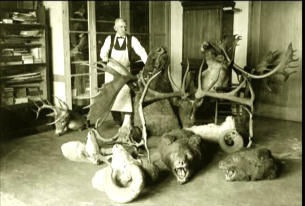

 The Accurate Reloading Forums
The Accurate Reloading Forums  THE ACCURATE RELOADING.COM FORUMS
THE ACCURATE RELOADING.COM FORUMS  Hunting
Hunting  Taxidermy
Taxidermy  Bill Stanley, 58, of Field Museum dies in Ethiopia
Bill Stanley, 58, of Field Museum dies in EthiopiaGo  | New  | Find  | Notify  | Tools  | Reply  |  |
| one of us |
http://www.chicagotribune.com/...20151006-column.html Bill Stanley, 58, of Field Museum dies in Ethiopia Bill Stanley, a Field Museum scientist, died of a heart attack while doing research in Ethiopia. Steve Johnson Contact Reporter Top Field Museum scientist Bill Stanley, 58, dies doing fieldwork in Africa. When he'd hear "roars of laughter coming from downstairs or around the corner," Larry Heaney said, he knew that his colleague, leading Field Museum scientist Bill Stanley, was giving one of his renowned tours of the museum's mammals collection. "People were just captivated," Heaney said. "Bill was very gregarious, very social and loved sharing his love for natural history and field biology and museums and all things related with anybody and everybody." Tuesday in Ethiopia, Stanley, 58, died while doing another part of his job that he loved, collecting specimens for his ongoing research on small mammals. Stanley's research, through which he'd discovered several new species and had a type of mouse and frog named after him, usually took him to Tanzania each year, Heaney said, but he had been invited to work in Ethiopia for the first time this year. A young biologist working with Stanley told Heaney and Field colleagues that Stanley had complained of numbness in his left arm and breathing difficulty after they finished their morning's work checking traps for a sampling of the small mammal population in a lowland area. He asked to go to the local hospital, where he shortly lost consciousness and was unable to be revived, said Heaney, a close colleague and research collaborator over several decades. "This is hitting people very, very hard," Heaney said. "What people here at the museum are saying is, he died with his boots on, and he died doing what he loved to do." Stanley had said much the same thing himself. "I'm not gonna retire," he told the news site DNAinfo in 2013. "I'm going to do this until the day I die." At the Field Museum since 1989, Stanley was its director of collections, overseeing more than 25 million specimens, and one of its leading scientific spokesmen. For a Tribune article on dioramas at the museum in April, Stanley led a reporter through the Field's displays and explained their historical and scientific significance. "Many of these dioramas, especially in the Asian Hall of Mammals, those habitats are gone or diminished or changed to the extent that you would not see the same scene today," Stanley said at the time. "This is not just mounted animals in a diorama. This is a representation of historical accuracy that is here for us to study, for the entire habitat." His frequent trips to Africa, both for research and tours of the Serengeti organized by the museum, were a kind of homecoming, Heaney explained. Born in Beirut and partly reared in Northern California, Stanley spent eight years of his childhood, including high school, in Kenya, said Heaney, the museum's curator of mammals. "Bill was really driven by an intense desire to learn more about the natural world and to convey that new information to other people," said Heaney. A Hyde Park resident, Stanley had been at the Field since earning undergraduate and graduate degrees from Humboldt State University in Arcata, Calif. In his biography on the museum website, Stanley explained his work: "I study the natural history, biogeography, taxonomy and evolution of mammals of eastern Africa, with emphasis on faunas of montane areas within Tanzania," Stanley wrote. "This long-term program has involved systematic faunal surveys of shrews and rodents in almost every montane (mountain) unit within Tanzania. ... Several new species of shrews and rodents have been described, as a result." A statement on the Field Museum's Facebook page Tuesday said this about Stanley: "Bill was warm, funny, and ... he loved sharing what he knew and did it in the friendliest, most engaging way possible, making him an invaluable asset to every department in this museum. "Bill's accomplishments are almost too many to list — in his research on Africa's mammals, he led biological surveys and safari trips every year, he has described numerous species and published countless papers. ... But beyond his academic accomplishments, we feel his loss most deeply as a friend." Services were pending. Stanley is survived by his longtime domestic partner, Mary Anne Rogers, a biologist who has worked at the Field Museum and Shedd Aquarium, Heaney said Kathi kathi@wildtravel.net 708-425-3552 "The world is a book, and those who do not travel read only one page." | ||
|
| Moderator |
Unfortunate to hear that. My father worked at the Field Museum in the 70's and I spent quite a lot of time wandering its halls. Back then the main route upstairs was an elevator that was still operated by an elevator attendant. Of course quite a few decades have passed since then and everyone I knew is no longer there but it is still sad to hear of someone passing. Making it relevant here, I remember one time taking the freight elevator and there was a guy from Taxidermy in there with most of a zebra carcass. for every hour in front of the computer you should have 3 hours outside | |||
|
| Powered by Social Strata |
| Please Wait. Your request is being processed... |
|
 The Accurate Reloading Forums
The Accurate Reloading Forums  THE ACCURATE RELOADING.COM FORUMS
THE ACCURATE RELOADING.COM FORUMS  Hunting
Hunting  Taxidermy
Taxidermy  Bill Stanley, 58, of Field Museum dies in Ethiopia
Bill Stanley, 58, of Field Museum dies in Ethiopia

Visit our on-line store for AR Memorabilia

